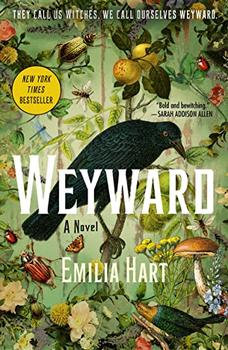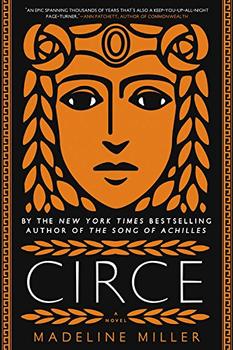Summary | Excerpt | Reading Guide | Reviews | Beyond the book | Read-Alikes | Genres & Themes | Author Bio

A Novel
by Emilia HartEmilia Hart's debut novel Weyward takes the reader on an enthralling journey back and forth across time to follow the stories of three extraordinary women. In 1619, Altha has been arrested and thrown into a dungeon to await trial for witchcraft. Four hundred years later, in 2019, Kate is trapped in an abusive relationship, from which she plans to escape. Centuries after Altha and decades before Kate, sixteen-year-old Violet lives a secluded life in a manor house in the north of England in 1942, with her strict father and younger brother Graham. Violet's special affinity with insects, birds and other animals, and her deeply felt connection to nature, lead the servants to see her as "uncanny" and "strange," and we gradually learn that all three women share these same gifts.
As the narrative unfolds, the connections between the three protagonists deepen, each of their stories a compelling, riveting, and at times nail-bitingly tense tale of being forced to endure, survive, and ultimately overcome misogyny and male violence in their respective eras. Some of the acts of violence against women in the book are graphically described and can be extremely triggering and distressing. Domestic violence, rape, abortion, still births, disease, and violent death are all integral parts of the plot that should come with content warnings.
It could be argued that, by containing elements of magical realism, the novel's underlying theme of female empowerment is diluted; after all, women in the real world do not possess the gifts of the Weyward women. However, the magical elements so beautifully evoked and eloquently rendered do not diminish what is ultimately a story or, rather, three stories, of strength and courage in the face of danger and adversity; stories of healing, stories of recovery, and ultimately stories of survival. Despite all attempts by men throughout the ages to oppress women and suppress their stories—as exemplified by a number of the male characters in this book—women and their legacies endure and thrive.
Switching from one story to another with each chapter, Hart successfully immerses the reader in the time periods of the three tales with her vivid, atmospheric descriptions and empathetic, insightful depictions. Between each era and character there is a subtle but evident tonal shift, highlighting their differences, moving effortlessly between time periods, and distinguishing each of the women's distinct and immensely sympathetic personalities. All three plots are captivating, subtly intersecting and overlapping as the three women uncover hidden truths about other women in their family and, thus, about themselves, and turning the latter part of the novel into a thrilling page-turner by ramping up the tension and finally coming together in hinted-at revelations towards the end. Weyward Cottage is the common denominator for the women and almost becomes a character in its own right. It is the link which connects the women across the generations, the place from where the threads of all their stories begin and to which they all finally return; it is woven at last into a meaningful whole tapestry, shaded with the melancholy of the past but also bright with hope for the future.
One of the most successful aspects of the book is its depiction of the Weyward women's mystical connection to the natural world. Their magical ability to communicate with animals and harness the power of nature comes across with poignant and delicate sensitivity, skillfully avoiding any potential magic-women-at-harmony-with-nature clichés. Throughout the book, the women's affinity with nature, particularly with birds and insects, provides an understated contrast between how brutally and cruelly they are treated by a male-dominated human world, and how kindly and protectively they are treated by the natural world. Weyward is an intelligent, hard-hitting, mesmerizing novel marking the auspicious debut of a talented writer and storyteller.
![]() This review was originally published in The BookBrowse Review in April 2023, and has been updated for the
March 2024 edition.
Click here to go to this issue.
This review was originally published in The BookBrowse Review in April 2023, and has been updated for the
March 2024 edition.
Click here to go to this issue.

If you liked Weyward, try these:

by Heather O'Neill
Published 2025
From the hugely acclaimed author beloved by literary lights, including Emily St. John Mandel, Kelly Link, and Mona Awad, a dark dystopian fairytale about an idyllic country ravaged by war—and a girl torn between safety and loyalty.

by Madeline Miller
Published 2020
Winner of the 2018 BookBrowse Fiction Award
The daring, dazzling and highly anticipated follow-up to the New York Times bestseller The Song of Achilles.
A truly good book teaches me better than to read it...
Click Here to find out who said this, as well as discovering other famous literary quotes!
Your guide toexceptional books
BookBrowse seeks out and recommends the best in contemporary fiction and nonfiction—books that not only engage and entertain but also deepen our understanding of ourselves and the world around us.